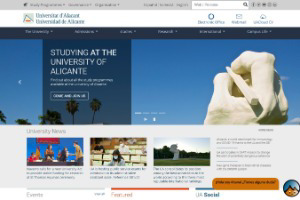University of Alicante
University Profile
Get a quick snapshot of the university's key details.
| University Name | University of Alicante |
|---|---|
| Name in Local Language | Universidad de Alicante |
| Acronym | UA |
| Year Established | 1979 |
| Motto | Sapere Aude |
| Motto in English | Dare to Know |
| Governing Type | Public |
| Student Body | Co-education |
| Highest Degree | Doctorate |
| Campus Type | Sub-urban |
Location
The university is located in San Vicente del Raspeig, Comunitat Valenciana. Find the address and map of the university below.
| Address | Ctra. S.Vicente del Raspeig, s/n, Campus San Vicente del Raspeig, San Vicente del Raspeig, Comunitat Valenciana, Spain |
|---|---|
Contact
Connect with the university easily! Find their contact details.
| Phone | +34 965903400 |
|---|---|
| Fax | +34 965903464 |
| Website |

|
| Click here to send email | |
| More Links |
Admission Info
Admission to the University of Alicante is based on the completion of prior academic qualifications. For undergraduate studies, students must hold a secondary school diploma equivalent to the Spanish Bachillerato and meet specific entrance exam requirements or qualifications, depending on the country of origin. Postgraduate applicants need to possess a relevant undergraduate degree and meet specific program requirements. International students may be required to provide proof of proficiency in Spanish or English, depending on the language of instruction, and they must submit translated academic transcripts along with a completed application. Some programs may also require additional tests or interviews.
| Accepts International Students | Yes |
|---|---|
| Admission Info | Click here |
Scholarship and Financial Aids
The University of Alicante offers a range of scholarships and financial aid opportunities to both local and international students. Scholarships are available for academic excellence, research projects, and students facing financial challenges. UA also has partnerships with various governmental and non-governmental organizations that provide funding for international students, particularly those from outside the European Union. In addition, the university offers a range of mobility programs and Erasmus+ opportunities for students who wish to study abroad as part of their academic journey.
| Scholarship Info | Click here |
|---|
Programs and Courses
Get a quick overview of programs and courses offered at this university.
| Bachelor's Degrees | Master's Degrees | Doctorate Degrees | Diplomas | |
|---|---|---|---|---|
| Arts & Humanities | n/a | |||
| Business & Social Sciences | n/a | |||
| Engineering | n/a | |||
| Language & Cultural Studies | n/a | n/a | n/a | |
| Medicine & Health | n/a | |||
| Science & Technology | n/a | n/a |
Click on the following button to explore a detailed list of programs and courses of this institute.
View Course ListRelated Articles
Stay informed with the following article related to the university or higher education in Spain.

